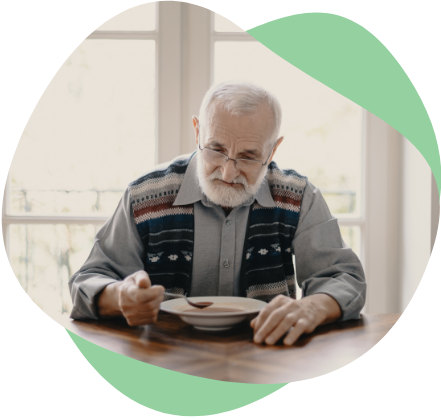Anxiety and depression in seniors
Like children and young adults, seniors are not immune to mental health challenges. Just because someone is 90, has lost some of their vision or feels tired doesn’t mean it’s normal for them to suffer from anxiety or depression.
While anxiety is marked by worry, hypervigilance and anticipation of danger, it can also share symptoms with depression, such as fatigue, irritability, sleep disturbances and loss of concentration.
As for geriatric depression, sadness isn’t always the main symptom. For many seniors, a loss of motivation is more common and can overshadow feelings of sadness. Like anxiety, depression in seniors is often hidden. They may not openly say they feel depressed, but rather express it through complaints, such as saying their days are long, they don’t feel like doing anything, or they’re not sleeping well.
Remember: anxiety and depression are never a normal part of aging.

Some stats
8 %
Between 6% and 8% of people over 65 and living at home have a diagnosed anxiety disorder, such as generalized anxiety disorder, panic disorder or phobia.
5 %
Between 4% and 5% of people over 65 and living at home are estimated to suffer from depression.
15 %
15% of people over 65 are living with significant psychological distress, such as anxiety, depression or insomnia. This level is twice as high as before the pandemic.
Source : Dr. Sébastien Grenier, psychologist and researcher at the Centre de recherche de l’Institut universitaire de gériatrie de Montréal.

The importance of using the right words
When talking with seniors, it’s important to use more familiar words for anxiety like “worries,” “concerns” or “nervousness” because the term “anxiety” may not resonate with them. Try gently exploring how they are feeling by asking about their mood and level of motivation. Once you have identified signs of anxiety or depression, the next step is encouraging them to consider psychotherapy. It’s never too late to get help for these disorders!
True or false?
Anxiety is often masked by physical problems.
TRUE
A senior may tell you they have a headache, or trouble digesting after a meal, or breathing difficulties, while in reality they are feeling nervous about an upcoming outing. They may also have underlying fears such as becoming dependent or losing their autonomy, losing their eyesight or hearing, being alone, getting sick or developing Alzheimer’s. Common physiological symptoms of anxiety include digestive problems, heart palpitations, shortness of breath, sweating and dizziness.
Video capsules
(Our videos are only in French)